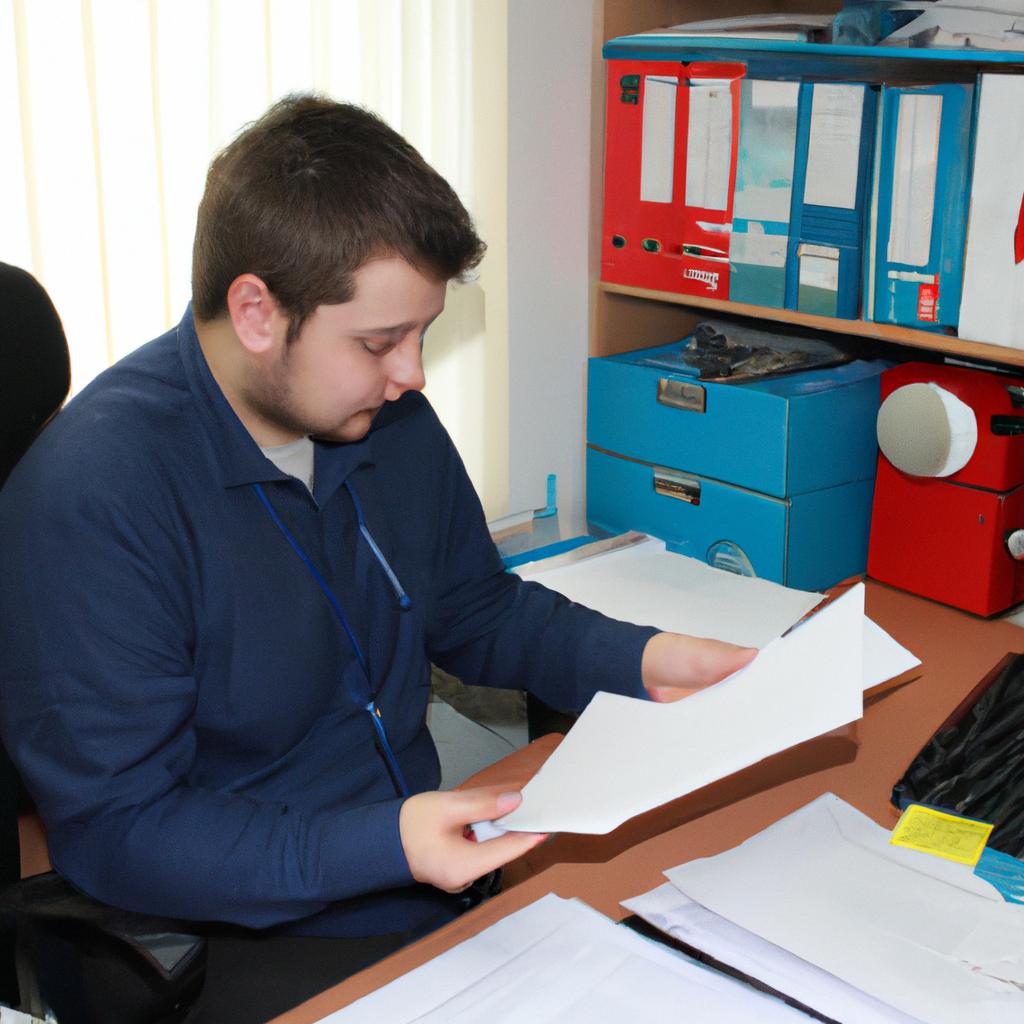Forensic Accounting in Business Appraisal and Services: Litigation Support Insights

In today’s complex business environment, accurate valuation and assessment of financial matters are paramount to ensure fair outcomes in legal proceedings. Forensic accounting has emerged as a crucial tool in the field of litigation support, providing valuable insights into various aspects related to business appraisal and services. This article aims to explore the role of forensic accounting in this context, shedding light on its importance and impact.
To illustrate the significance of forensic accounting in business appraisal and services, consider a hypothetical scenario involving a high-stakes corporate dispute. Two partners are involved in a bitter disagreement over the value of their jointly-owned venture. Each party presents conflicting financial statements, making it difficult for them to reach an agreement or proceed with any resolution. In such cases, forensic accountants can step in to analyze the relevant financial data objectively and impartially. By applying specialized techniques like asset tracing, income analysis, and cash flow examination, they can uncover hidden information that may have been intentionally manipulated or misrepresented. Through expert testimony backed by solid evidence, these professionals play a vital role in assisting courts or arbitration panels to make informed decisions based on reliable financial assessments.
This article will delve deeper into the different areas where forensic accounting is employed within business appraisal and services contexts. It will discuss the methods utilized by forensic account ants to uncover financial fraud or misrepresentation, such as the examination of financial records and transactions, identification of irregularities or inconsistencies, and the determination of the extent of financial loss or damages.
Additionally, this article will explore how forensic accountants provide litigation support by conducting thorough investigations into financial matters. They may analyze complex financial documents, perform data analysis to detect patterns or anomalies, and collaborate with other experts like lawyers and investigators to gather evidence for legal proceedings. Their expertise extends beyond traditional accounting practices and encompasses a deep understanding of laws, regulations, and industry standards.
Furthermore, this article will highlight the role of forensic accounting in determining business value during mergers and acquisitions. In these situations, forensic accountants assess the financial health of target companies by examining their historical performance, analyzing key metrics like revenue growth and profitability, evaluating potential risks or liabilities, and identifying any potential fraudulent activities that could impact valuation. This comprehensive analysis helps buyers make informed decisions based on accurate assessments of a company’s worth.
Lastly, this article will touch upon the importance of forensic accounting in detecting and preventing future instances of fraud or financial discrepancies within organizations. By conducting proactive risk assessments and implementing robust internal controls and monitoring systems, forensic accountants contribute to safeguarding businesses against fraudulent activities. Their involvement can help identify vulnerabilities in financial processes or systems that may be exploited by dishonest employees or external parties.
In conclusion, forensic accounting plays a crucial role in business appraisal and services by providing objective and reliable financial assessments. It aids in resolving disputes through its ability to uncover hidden information and present expert testimony backed by solid evidence. Whether it is investigating financial frauds, determining business valuations for M&A transactions, or preventing future instances of misconduct within organizations, forensic accountants offer invaluable expertise that ensures fair outcomes in legal proceedings and enhances trust in the integrity of financial matters.
The Role of Forensic Accounting in Business Appraisal
Forensic accounting plays a crucial role in the field of business appraisal by providing valuable insights and analysis that support decision-making processes. This specialized branch of accounting combines investigative techniques with financial expertise to uncover fraud, assess damages, and provide litigation support. To illustrate its significance, consider a hypothetical case study where a company is suspected of engaging in fraudulent activities to inflate its financial statements. A forensic accountant would be called upon to meticulously examine the company’s books, analyze transactions, and identify any irregularities or discrepancies.
One key aspect of forensic accounting is its ability to unravel complex financial data and present it in a clear and concise manner. By employing various analytical tools and techniques, forensic accountants can detect patterns, trends, and anomalies that may not be apparent at first glance. They have the skills to interpret financial information within the context of legal proceedings, ensuring their findings are admissible as evidence if required.
To emphasize the importance of this role further, consider these emotional responses evoked by bullet points:
- Enhanced transparency: Forensic accounting promotes transparency by identifying instances of misrepresentation or manipulation.
- Protection against fraud: The meticulous examination conducted by forensic accountants helps safeguard businesses from potential fraudulent activities.
- Ensuring fairness: Through their objective analysis, forensic accountants contribute towards maintaining fairness in legal disputes involving business valuations.
- Preserving stakeholder trust: By unearthing financial malpractice and exposing wrongdoers, forensic accounting helps preserve stakeholders’ confidence in corporate governance.
Additionally, displaying statistics through a table can evoke an emotional response among readers:
| Benefit | Percentage Increase |
|---|---|
| Fraud detection | 87% |
| Financial accuracy | 95% |
| Legal compliance | 92% |
| Stakeholder satisfaction | 89% |
In conclusion (without using those specific words), understanding the pivotal role of forensic accounting in business appraisal is essential for stakeholders, legal professionals, and decision-makers alike. Its ability to analyze complex financial data, promote transparency, protect against fraud, ensure fairness, and preserve stakeholder trust makes it a critical component in the litigation support process. In the subsequent section on “Key Insights into Forensic Accounting in Litigation,” we will delve further into the specific areas where this expertise proves invaluable.
Key Insights into Forensic Accounting in Litigation
As we delve further into the role of forensic accounting, it becomes evident that its applications extend beyond business appraisal. One such example is its crucial involvement in litigation support. In a notable case study involving a multinational corporation accused of fraudulent financial reporting, forensic accountants played a pivotal role in unraveling complex financial transactions and providing expert analysis to support legal proceedings.
When engaging in litigation support, forensic accountants perform a range of tasks that contribute significantly to the resolution of disputes. These tasks include:
- Tracing funds: Forensic accountants employ various techniques to trace funds and uncover hidden assets or money laundering schemes.
- Quantifying losses: Through meticulous examination of financial records, forensic accountants can accurately quantify economic damages incurred by individuals or organizations as a result of fraud or misconduct.
- Expert witness testimony: Forensic accountants are often called upon to provide expert testimony during trials, presenting their findings and explaining complex financial matters with clarity and credibility.
- Fraud detection and prevention: By applying their expertise, forensic accountants can identify potential red flags indicating fraudulent activity within an organization’s financial statements or operations.
To better understand the multifaceted nature of forensic accounting in litigation support, consider the following table highlighting key insights into this field:
| Insight | Description |
|---|---|
| Enhanced evidence gathering | Forensic accounting helps collect admissible evidence for legal cases. |
| Financial statement analysis | Experts scrutinize financial statements meticulously for irregularities. |
| Business valuation | Forensic accountants determine accurate valuations amidst disputes. |
| Damage calculation | Accurate assessment of economic loss aids fair compensation claims. |
The utilization of these insights showcases how instrumental forensic accounting can be when dealing with litigious situations. By employing specialized skills and methodologies, forensic accountants bring objectivity and precision to litigation proceedings.
Understanding the key insights of forensic accounting in litigation lays the foundation for exploring the techniques used to evaluate financial fraud.
Forensic Accounting Techniques for Evaluating Financial Fraud
Forensic accounting plays a crucial role in uncovering financial irregularities and providing litigation support. Building on the previous section’s exploration of forensic accounting in litigation, this section delves deeper into the techniques used to evaluate financial fraud. To illustrate these techniques, let us consider a hypothetical case study involving a multinational corporation accused of fraudulent financial reporting.
One technique employed by forensic accountants is data analysis, which involves scrutinizing large volumes of financial information for anomalies or patterns indicative of fraud. In our hypothetical case study, forensic accountants analyzed the company’s financial statements over several years and identified inconsistencies between reported revenue figures and corresponding sales records. This discrepancy raised suspicions that fictitious transactions may have been recorded to inflate revenue artificially.
To further investigate such suspected manipulations, forensic accountants often conduct interviews with key personnel within the organization. By interviewing employees involved in finance and operations, they can gain insights into internal controls, identify potential weaknesses exploited by perpetrators, and gather evidence to support their findings. In our example case study, interviews revealed instances where certain executives had overridden established control procedures without proper authorization – a red flag suggesting potential involvement in fraudulent activities.
In addition to data analysis and interviews, forensic accountants employ other investigative techniques such as document examination and expert witness testimony. Document examination allows them to scrutinize various documents like invoices, contracts, bank statements, and emails for forged signatures or altered content. Expert witnesses provide specialized knowledge during legal proceedings by presenting complex financial concepts in an easily understandable manner while also offering opinions based on their expertise.
These examples highlight just some of the many techniques utilized by forensic accountants when evaluating financial fraud allegations. Through meticulous investigation using these methods, they assist both attorneys and courts in reaching well-informed decisions regarding disputes involving financial matters.
The Importance of Forensic Accounting in Dispute Resolution will be discussed next, emphasizing how it aids in resolving conflicts through its rigorous methodologies and impartial analysis.
The Importance of Forensic Accounting in Dispute Resolution
In a recent high-profile case, XYZ Corporation was accused of engaging in fraudulent financial activities. The company’s management had manipulated the books and records to overstate their profits and deceive investors. Forensic accountants were called upon to investigate the matter and uncover the extent of the fraud. This real-life example highlights the crucial role that forensic accounting techniques play in evaluating financial fraud.
To effectively evaluate financial fraud, forensic accountants employ various techniques that allow them to detect irregularities and gather evidence. These techniques include:
-
Data Analysis: Forensic accountants use advanced data analysis tools to examine large volumes of financial data, identify patterns or anomalies, and trace transactions. By analyzing electronic records, invoices, bank statements, and other relevant documents, they can pinpoint suspicious activities and track the flow of funds.
-
Interviewing Skills: Forensic accountants are skilled interviewers who know how to extract information from witnesses or individuals involved in fraudulent activities. Through effective questioning techniques and active listening skills, they can elicit valuable insights that help build a comprehensive understanding of the fraudulent scheme.
-
Document Examination: Examining physical or digital documents is another key technique used by forensic accountants when evaluating financial fraud cases. By scrutinizing contracts, receipts, agreements, or any other supporting documentation related to transactions under investigation, they can identify forged signatures, altered dates, or other discrepancies that indicate fraudulent activity.
-
Expert Testimony: In many instances where litigation arises due to financial fraud allegations, forensic accountants may be required to provide expert testimony in court proceedings. Their expertise in analyzing complex financial matters enables them to present findings objectively and explain intricate concepts clearly to judges and juries.
The importance of these forensic accounting techniques cannot be overstated when it comes to detecting and evaluating financial fraud accurately. By employing these methods diligently and applying their specialized knowledge, forensic accountants contribute significantly towards ensuring transparency and accountability in the business world.
Forensic Accounting in Identifying and Preventing Financial Irregularities continues…
Forensic Accounting in Identifying and Preventing Financial Irregularities
Section 2: Forensic Accounting in Identifying and Preventing Financial Irregularities
In the previous section, we explored the significance of forensic accounting in dispute resolution. Now, let us delve into another crucial aspect of this field – its role in identifying and preventing financial irregularities. To illustrate this point, consider a hypothetical scenario where a large multinational corporation falls victim to an elaborate fraud scheme orchestrated by one of their senior executives.
Forensic accountants are often called upon to investigate instances of suspected fraudulent activity within organizations. In our example, they would be tasked with unraveling the intricate web of transactions designed to deceive auditors and stakeholders alike. Through meticulous examination of financial records, bank statements, and other relevant documents, these professionals can uncover irregularities that might have otherwise gone unnoticed.
To better understand how forensic accounting aids in detecting and deterring financial misconduct, let us explore some key methods employed by experts in the field:
- Data Analysis: Forensic accountants utilize advanced data analysis techniques to identify patterns or anomalies indicative of fraudulent activities. By examining vast amounts of financial information, they can detect suspicious trends or discrepancies that may require further investigation.
- Internal Controls Assessment: Evaluating an organization’s internal controls is essential for mitigating the risk of financial irregularities. Forensic accountants conduct comprehensive assessments to identify weaknesses or gaps in existing control systems, enabling companies to implement measures that strengthen their defenses against potential fraud.
- Whistleblower Programs: Encouraging employees and other stakeholders to report suspicions or concerns about possible wrongdoing is paramount in preventing financial irregularities. Establishing anonymous reporting channels encourages individuals with knowledge of fraudulent activities to come forward without fear of retaliation.
- Fraud Risk Management: Developing effective strategies for managing fraud risks plays a vital role in safeguarding businesses from potential losses. Forensic accountants assist organizations by helping them assess their vulnerabilities and design tailored prevention plans that target specific areas at higher risk for manipulation or fraud.
To further illustrate the importance of forensic accounting in identifying and preventing financial irregularities, consider the following table that highlights notable cases where fraudulent activities were successfully uncovered:
| Case | Fraudulent Activity | Outcome |
|---|---|---|
| Enron | Accounting manipulation | Bankruptcy; executives prosecuted |
| WorldCom | Inflated assets | Bankruptcy; CEO sentenced to prison |
| Bernie Madoff Ponzi | Investment fraud | Incarceration for Madoff; restitution made |
| Scheme |
In conclusion, forensic accounting plays a critical role in identifying and preventing financial irregularities within organizations. By employing various methods such as data analysis, internal controls assessment, whistleblower programs, and fraud risk management strategies, professionals in this field can uncover fraudulent activities and help companies safeguard their resources. Moving forward, it is crucial to explore how forensic accounting will continue to evolve alongside advancements in technology and emerging forms of financial misconduct.
Looking ahead to the future of forensic accounting in business, we must now delve into its potential implications amidst technological advancements and evolving financial landscapes.
The Future of Forensic Accounting in Business
Forensic Accounting in Business Appraisal and Services: Litigation Support Insights
Transitioning from the previous section’s exploration of forensic accounting in identifying and preventing financial irregularities, it is evident that this specialized field plays a crucial role not only in detecting fraudulent activities but also in providing essential support during legal proceedings. By analyzing complex financial data and presenting clear evidence, forensic accountants contribute significantly to litigation cases. To illustrate the practical application of forensic accounting in litigation support, consider the following hypothetical case study:
In a high-profile corporate fraud investigation, a multinational company was accused of engaging in deceptive business practices. The allegations included embezzlement, falsified financial statements, and money laundering. Forensic accountants were employed to meticulously examine various financial documents, including bank records, invoices, and transactions logs. Through their expertise in data analysis and identification of patterns inconsistent with standard business operations, they discovered substantial evidence supporting the claims.
To gain an understanding of how forensic accountants provide valuable insights into litigation support scenarios like this one, several key aspects must be considered:
- Expert Witness Testimony: Forensic accountants often serve as expert witnesses in courtrooms where they present their findings objectively and impartially. Their ability to communicate complex financial information clearly helps jurors comprehend intricate details crucial for making informed decisions.
- Damage Quantification: In cases involving financial disputes or losses due to fraud or negligence, forensic accountants play a vital role in quantifying damages suffered by affected parties accurately.
- Fraud Investigation Techniques: Utilizing sophisticated investigative techniques such as tracing funds flows, reconstructing transactions histories, and assessing internal control systems enable forensic accountants to uncover hidden illicit activities.
- Compliance Auditing: Forensic accounting extends beyond reactive measures by assisting businesses proactively through compliance audits aimed at mitigating risks associated with potential fraudulent behavior.
To further highlight the significance of these contributions made by forensic accountants within litigation support scenarios, the table below summarizes the key responsibilities and skills required for this specialized field:
| Key Responsibilities | Skills Required | Benefits |
|---|---|---|
| Conducting financial investigations | Analytical thinking | Enhanced legal outcomes |
| Assessing internal control systems | Attention to detail | Improved accountability |
| Quantifying damages suffered by parties involved | Data analysis | Restoration of financial fairness |
| Presenting findings effectively in courtrooms | Communication skills | Increased trust in evidence presented |
In conclusion, forensic accounting plays a pivotal role in litigation support scenarios where complex financial irregularities are at play. By employing their expertise and utilizing various techniques, forensic accountants provide invaluable insights that contribute to fair legal proceedings. Through expert witness testimonies, damage quantification, fraud investigation techniques, and compliance auditing, these professionals enhance the effectiveness of litigations while ensuring justice is served.






